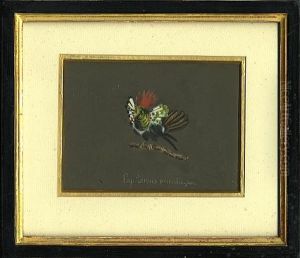Wilhelm Johann Dan. Hartmann Paintings
Wilhelm Johann Daniel Hartmann, born in 1774, was a lesser-known German artist who lived during a period of significant cultural and political changes in Europe. His life and work were situated against the backdrop of the late Enlightenment and the Napoleonic Wars. While Hartmann may not have achieved the same level of fame as some of his contemporaries, his contributions to the art world of his time remain a subject of interest for art historians who specialize in that era.
Hartmann's artistic career unfolded during the transition from the Rococo style, which was characterized by ornate and decorative art, to the more restrained and moralizing approach of Neoclassicism. This shift reflected the broader intellectual movements of the time, including a renewed interest in the art and philosophy of ancient Greece and Rome. Hartmann would have been exposed to these changing artistic trends, which were sweeping through Europe and influencing artists, thinkers, and patrons alike.
Details about Hartmann's personal life, artistic training, and the specific works he produced are not as well-documented as those of more prominent figures from the period. As a result, his biography is not as richly detailed as those of artists like Jacques-Louis David or J.M.W. Turner, who left behind extensive bodies of work and written records. Nevertheless, Hartmann's existence within the artistic milieu of the time would have involved engaging with the same aesthetic debates and attempting to find patronage and recognition for his work.
Wilhelm Johann Daniel Hartmann passed away in 1822, having lived through a dynamic period in European art. Despite the scarcity of information about his life and oeuvre, Hartmann's career is a reminder of the many artists whose legacies are not fully recorded or celebrated but who nonetheless contributed to the rich tapestry of art history. Art historians who uncover traces of such artists work to piece together their stories, ensuring that their roles in the cultural landscape of their time are not forgotten.
